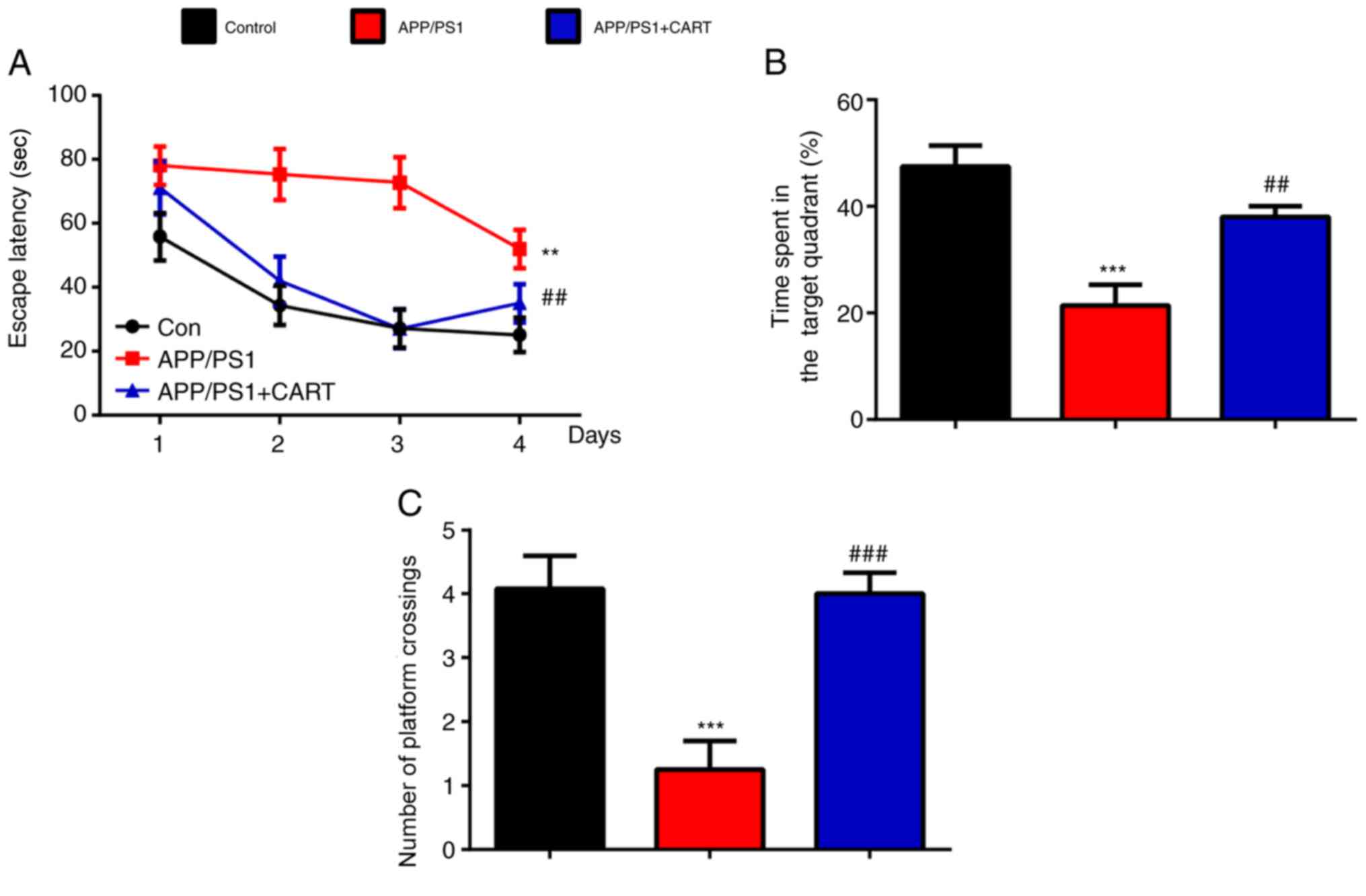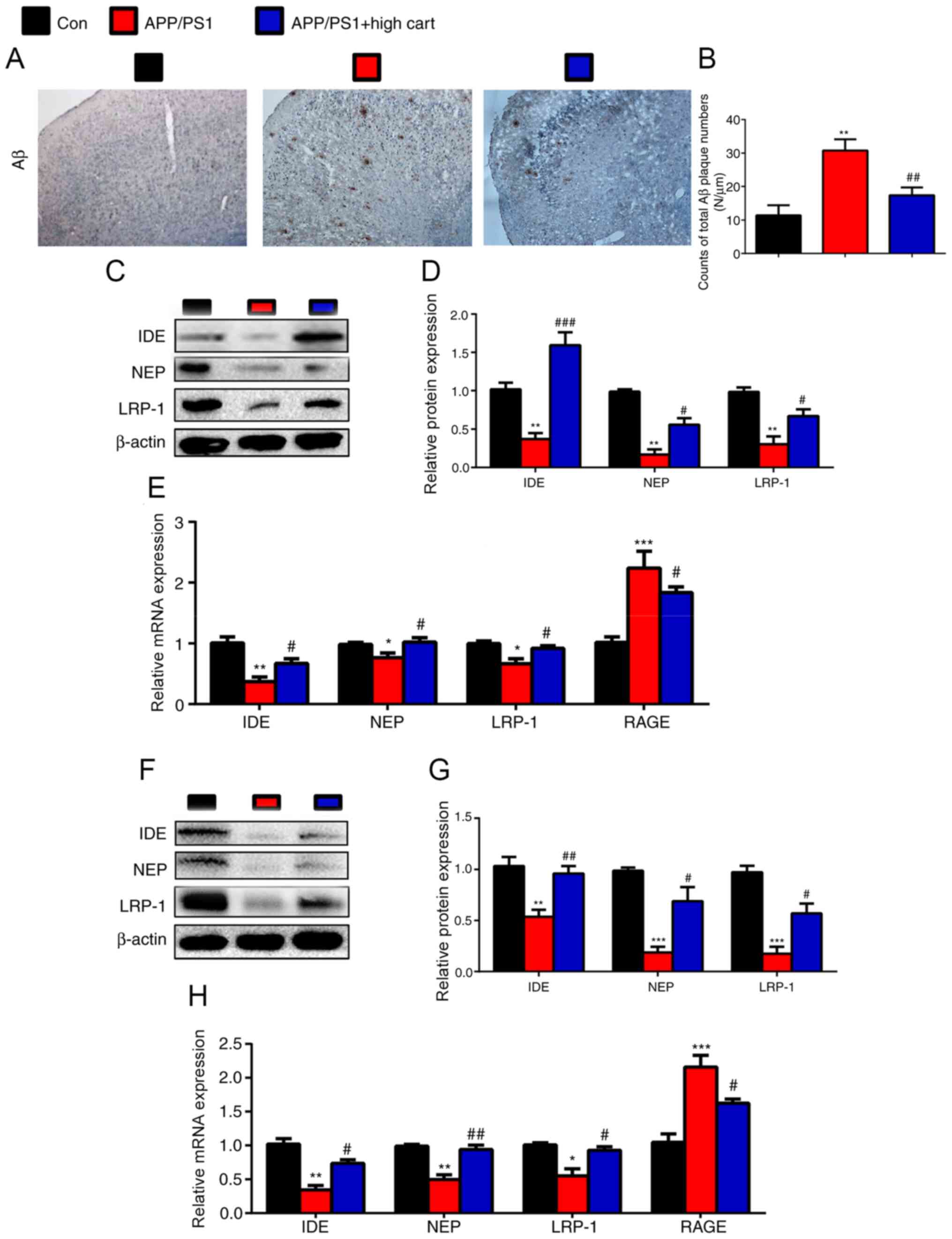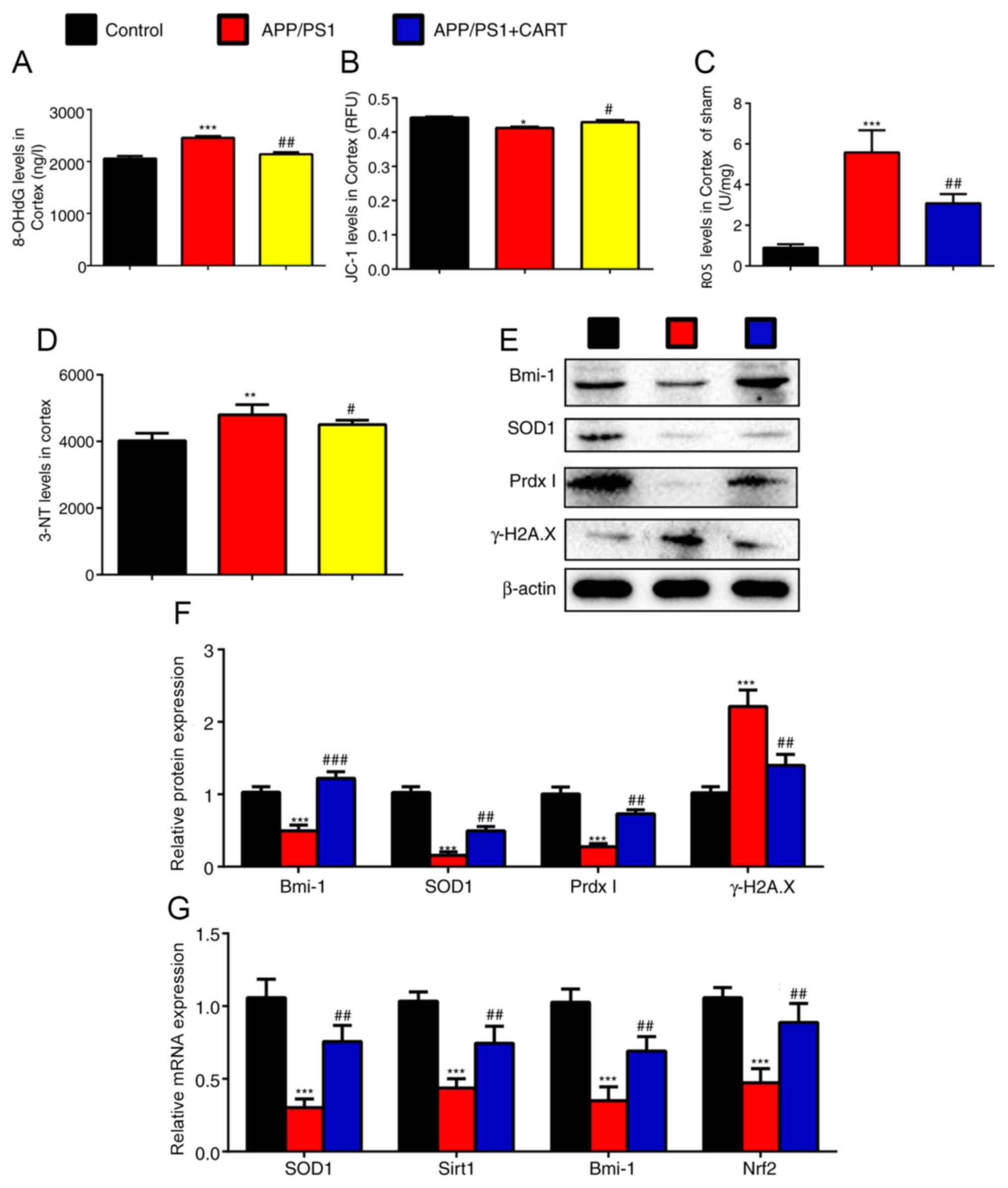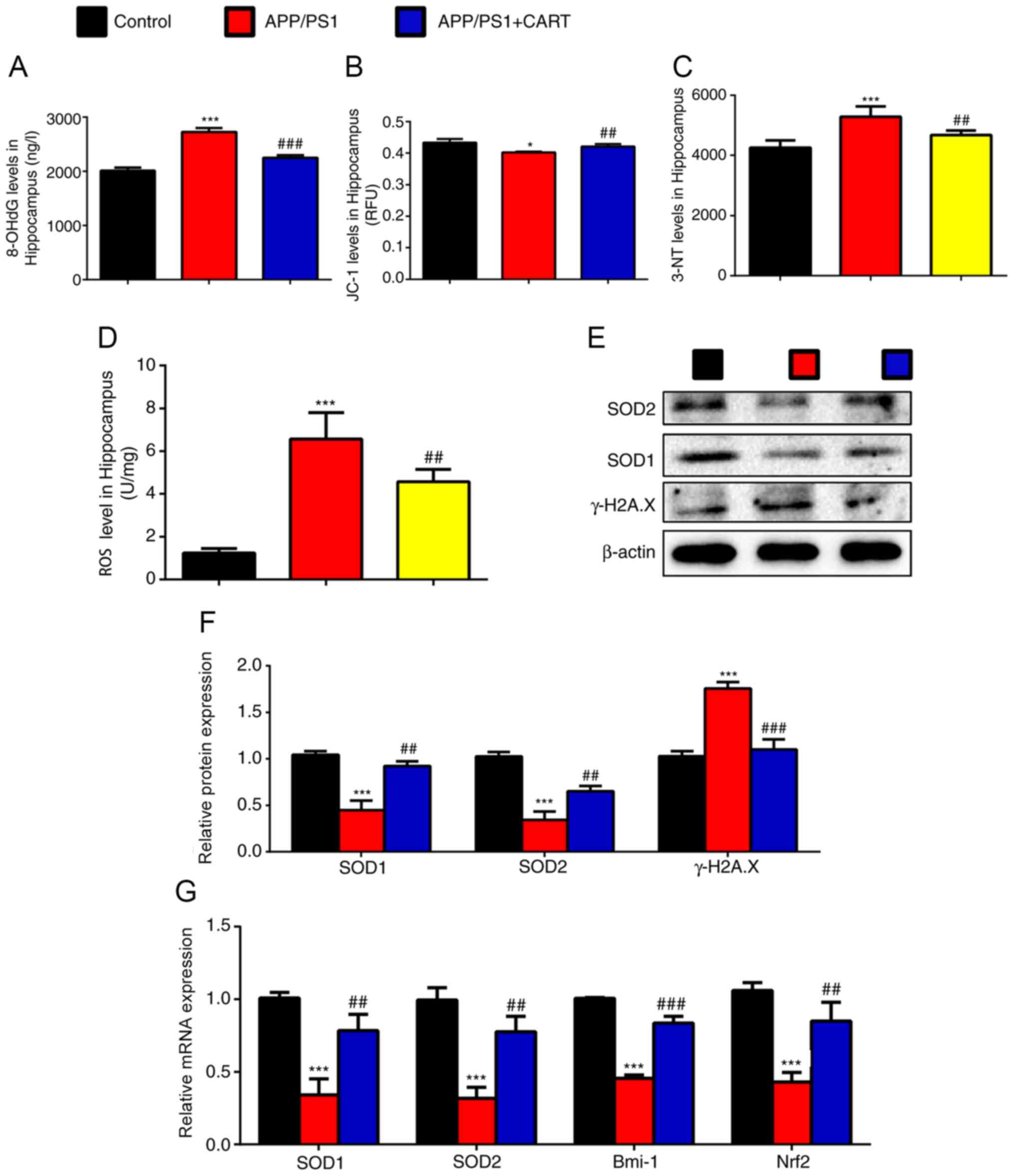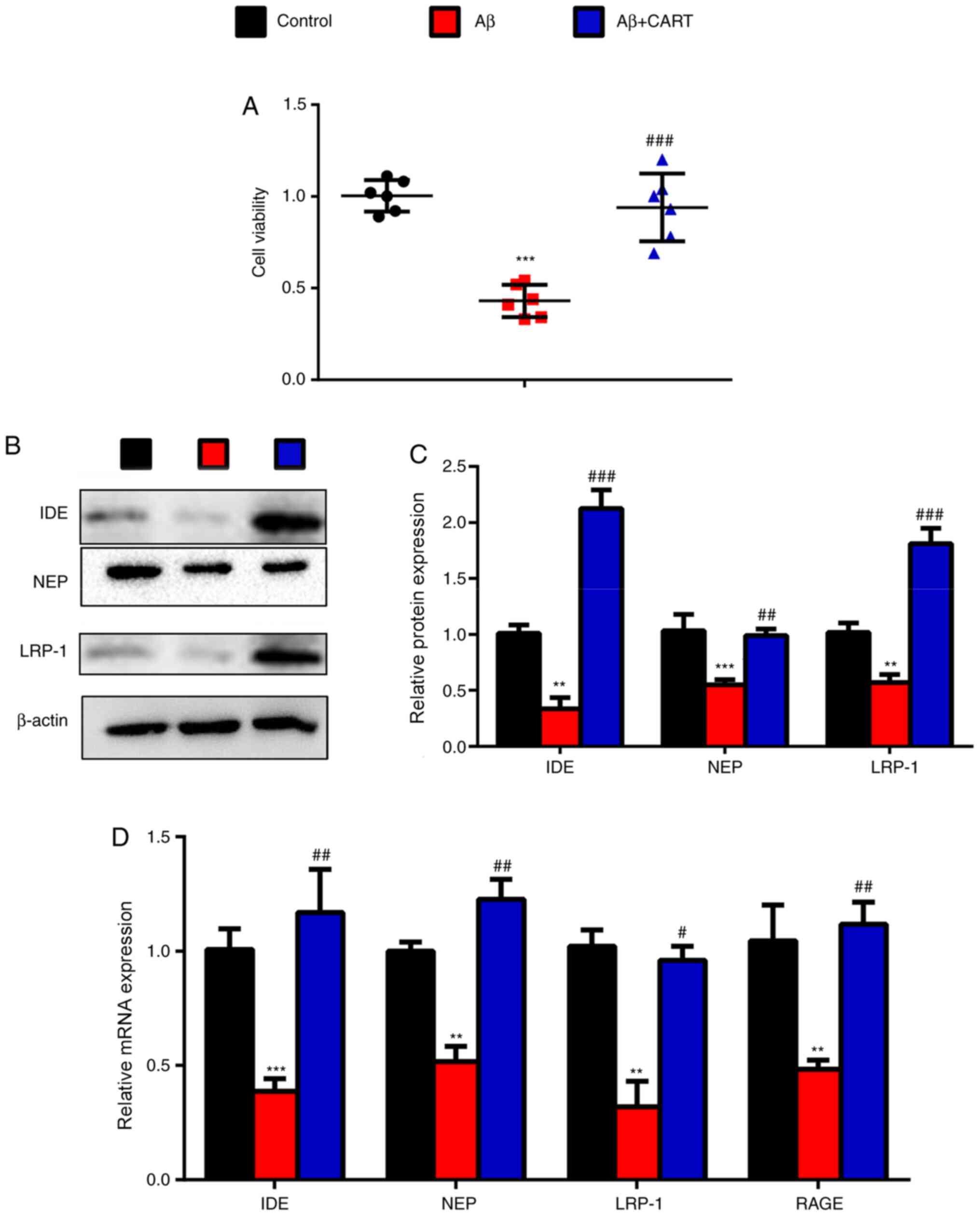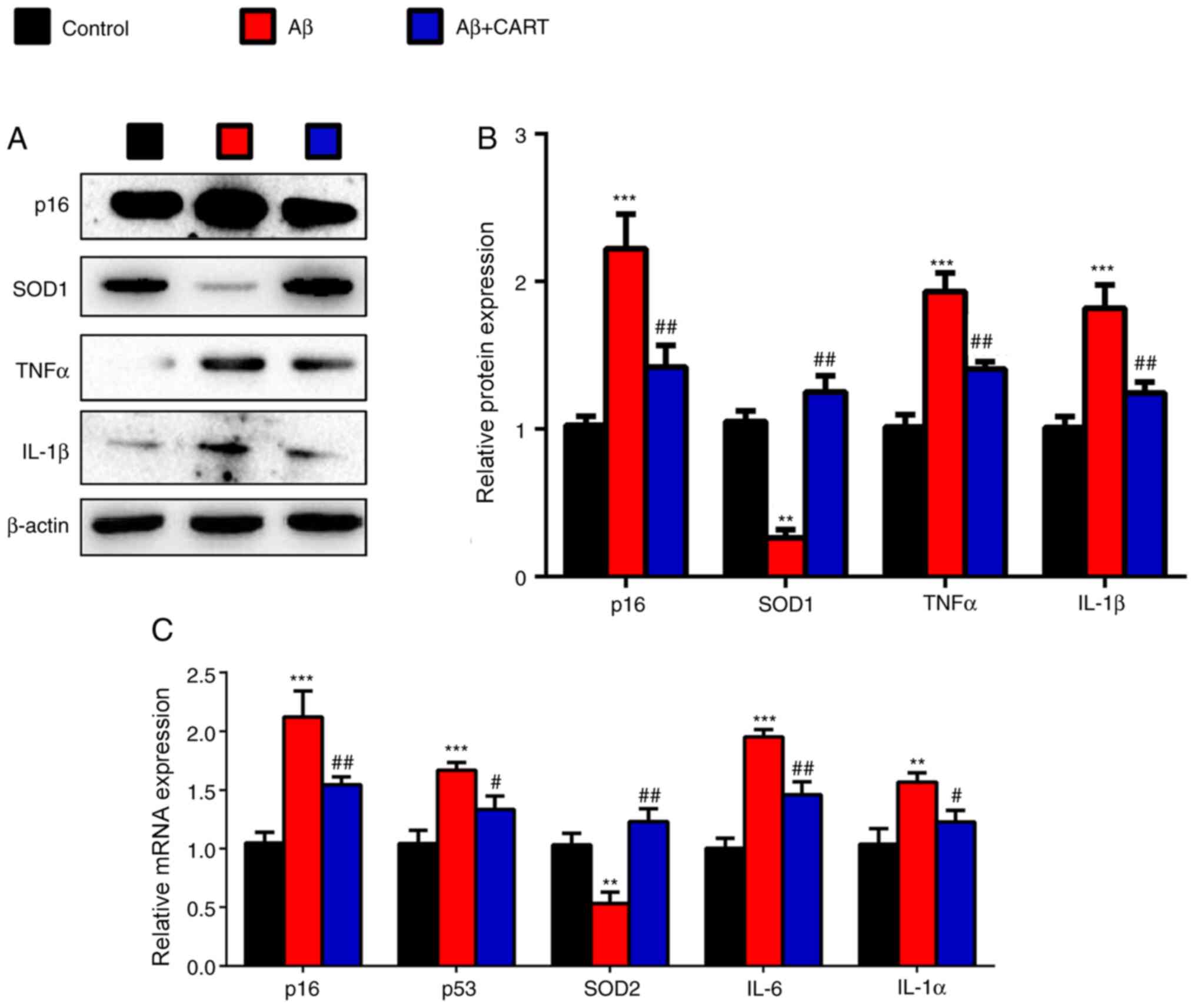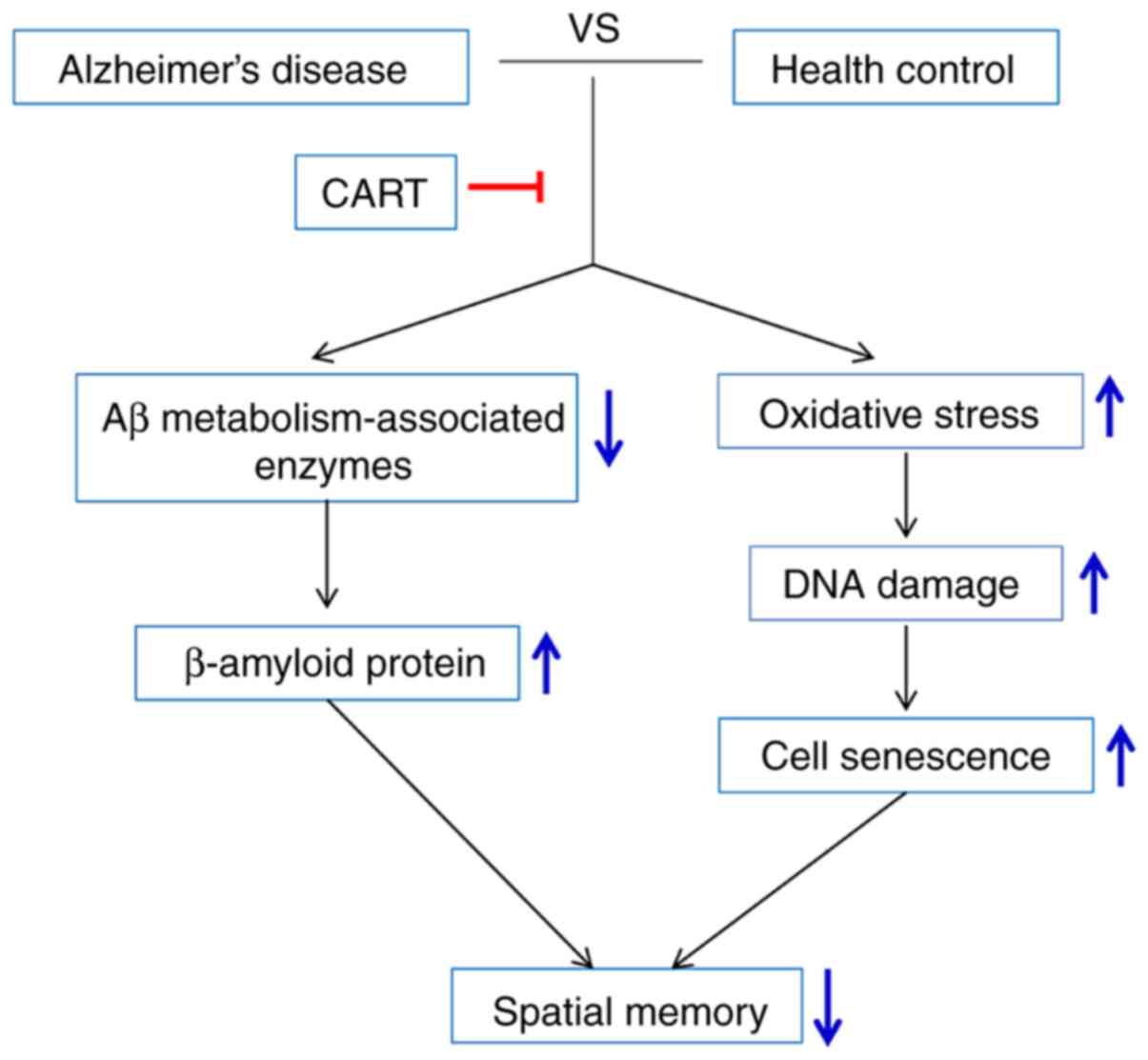|
1
|
Barnham KJ, Masters CL and Bush AI:
Neurodegenerative diseases and oxidative stress. Nat Rev Drug
Discov. 3:205–214. 2004. View
Article : Google Scholar : PubMed/NCBI
|
|
2
|
Dalakas MC, Alexopoulos H and Spaeth PJ:
Complement in neurological disorders and emerging
complement-targeted therapeutics. Nat Rev Neurol. 16:601–617. 2020.
View Article : Google Scholar : PubMed/NCBI
|
|
3
|
Sastre M, Walter J and Gentleman SM:
Interactions between APP secretases and inflammatory mediators. J
Neuroinflammation. 5:252008. View Article : Google Scholar : PubMed/NCBI
|
|
4
|
Jin JL, Liou AK, Shi Y, Yin KL, Chen L, Li
LL, Zhu XL, Qian L, Yang R, Chen J and Xu Y: CART treatment
improves memory and synaptic structure in APP/PS1 mice. Sci Rep.
5:102242015. View Article : Google Scholar : PubMed/NCBI
|
|
5
|
Hijazi S, Heistek TS, Scheltens P, Neumann
U, Shimshek DR, Mansvelder HD, Smit AB and van Kesteren RE: Early
restoration of parvalbumin interneuron activity prevents memory
loss and network hyperexcitability in a mouse model of Alzheimer's
disease. Mol Psychiatry. 25:3380–3398. 2020. View Article : Google Scholar : PubMed/NCBI
|
|
6
|
Javed I, Zhang Z, Adamcik J, Andrikopoulos
N, Li Y, Otzen DE, Lin S, Mezzenga R, Davis TP, Ding F and Ke PC:
Accelerated amyloid beta pathogenesis by bacterial amyloid FapC.
Adv Sci (Weinh). 7:20012992020. View Article : Google Scholar : PubMed/NCBI
|
|
7
|
Pulina MV, Hopkins M, Haroutunian V,
Greengard P and Bustos V: C99 selectively accumulates in vulnerable
neurons in Alzheimer's disease. Alzheimers Dement. 16:273–282.
2020. View Article : Google Scholar : PubMed/NCBI
|
|
8
|
Biswas SC, Shi Y, Vonsattel JP, Leung CL,
Troy CM and Greene LA: Bim is elevated in Alzheimer's disease
neurons and is required for beta-amyloid-induced neuronal
apoptosis. J Neurosci. 27:893–900. 2007. View Article : Google Scholar : PubMed/NCBI
|
|
9
|
Reddy PH and Oliver DM: Amyloid beta and
phosphorylated tau-induced defective autophagy and mitophagy in
Alzheimer's disease. Cells. 8:4882019. View Article : Google Scholar
|
|
10
|
Rafii MS and Aisen PS: Recent developments
in Alzheimer's disease therapeutics. BMC Med. 7:72009. View Article : Google Scholar : PubMed/NCBI
|
|
11
|
May-Zhang LS, Kirabo A, Huang J, Linton
MF, Davies SS and Murray KT: Scavenging reactive lipids to prevent
oxidative injury. Annu Rev Pharmacol Toxicol. Sep 30–2020.(Epub
ahead of print). doi: 10.1146/annurev-pharmtox-031620-035348.
PubMed/NCBI
|
|
12
|
Chen X, Ji B, Hao X, Li X, Eisele F,
Nyström T and Petranovic D: FMN reduces Amyloid-β toxicity in yeast
by regulating redox status and cellular metabolism. Nat Commun.
11:8672020. View Article : Google Scholar : PubMed/NCBI
|
|
13
|
Iwata N, Tsubuki S, Takaki Y, Watanabe K,
Sekiguchi M, Hosoki E, Kawashima-Morishima M, Lee HJ, Hama E,
Sekine-Aizawa Y and Saido TC: Identification of the major
Abeta1-42-degrading catabolic pathway in brain parenchyma:
Suppression leads to biochemical and pathological deposition. Nat
Med. 6:143–150. 2000. View
Article : Google Scholar : PubMed/NCBI
|
|
14
|
Deprez-Poulain R, Hennuyer N, Bosc D,
Liang WG, Enée E, Marechal X, Charton J, Totobenazara J, Berte G,
Jahklal J, et al: Catalytic site inhibition of insulin-degrading
enzyme by a small molecule induces glucose intolerance in mice. Nat
Commun. 6:82502015. View Article : Google Scholar : PubMed/NCBI
|
|
15
|
Ali T, Badshah H, Kim TH and Kim MO:
Melatonin attenuates D-galactose-induced memory impairment,
neuroinflammation and neurodegeneration via RAGE/NF-K B/JNK
signaling pathway in aging mouse model. J Pineal Res. 58:71–85.
2015. View Article : Google Scholar : PubMed/NCBI
|
|
16
|
Yan FL, Zheng Y and Zhao FD: Effects of
Ginkgo biloba extract EGb761 on expression of RAGE and LRP-1
in cerebral microvascular endothelial cells under chronic hypoxia
and hypoglycemia. Acta Neuropathol. 116:529–535. 2008. View Article : Google Scholar : PubMed/NCBI
|
|
17
|
Dallvechia-Adams S, Kuhar MJ and Smith Y:
Cocaine- and amphetamine-regulated transcript peptide projections
in the ventral midbrain: Colocalization with gamma-aminobutyric
acid, melanin-concentrating hormone, dynorphin, and synaptic
interactions with dopamine neurons. J Comp Neurol. 448:360–372.
2002. View Article : Google Scholar : PubMed/NCBI
|
|
18
|
Zhang Z, Cao X, Bao X, Zhang Y, Xu Y and
Sha D: Cocaine- and amphetamine-regulated transcript protects
synaptic structures in neurons after ischemic cerebral injury.
Neuropeptides. 81:1020232020. View Article : Google Scholar : PubMed/NCBI
|
|
19
|
Hunter RG and Kuhar MJ: CART peptides as
targets for CNS drug development. Current drug targets. Curr Drug
Targets CNS Neurol Disord. 2:201–205. 2003. View Article : Google Scholar : PubMed/NCBI
|
|
20
|
Janiuk I and Mlynek K: Immunodetection of
cocaine- and amphetamine-regulated transcript in bovine pancreas.
Acta Histochem. 117:545–550. 2015. View Article : Google Scholar : PubMed/NCBI
|
|
21
|
Gilon P: Cocaine- and
amphetamine-regulated transcript: A novel regulator of energy
homeostasis expressed in a subpopulation of pancreatic islet cells.
Diabetologia. 59:1855–1859. 2016. View Article : Google Scholar : PubMed/NCBI
|
|
22
|
Rząp D, Czajkowska M and Całka J:
Neurochemical plasticity of nNOS-, VIP- and CART-immunoreactive
neurons following prolonged acetylsalicylic acid supplementation in
the porcine jejunum. Int J Mol Sci. 21:21572020. View Article : Google Scholar
|
|
23
|
Hsieh YS, Chen PN, Yu CH, Chen CH, Tsai TT
and Kuo DY: Involvement of oxidative stress in the regulation of
NPY/CART-mediated appetite control in amphetamine-treated rats.
Neurotoxicology. 48:131–141. 2015. View Article : Google Scholar : PubMed/NCBI
|
|
24
|
Yin KL, Jin JL, Zhu XL, Yu L, Wang S, Qian
L, Han L and Xu Y: CART modulates beta-amyloid
metabolism-associated enzymes and attenuates memory deficits in
APP/PS1 mice. Neurol Res. 39:885–894. 2017. View Article : Google Scholar : PubMed/NCBI
|
|
25
|
Sha DJ, Li LL, Ye L, Li R and Xu Y:
Icariin inhibits neurotoxicity of beta-amyloid by upregulating
cocaine-regulated and amphetamine-regulated transcripts.
Neuroreport. 20:1564–1567. 2009. View Article : Google Scholar : PubMed/NCBI
|
|
26
|
Wang GH, Jiang XY, Pu HJ, Zhang W, An C,
Hu X, Liou AK, Leak RK, Gao Y and Chen J: Scriptaid, a novel
histone deacetylase inhibitor, protects against traumatic brain
injury via modulation of PTEN and AKT pathway: Scriptaid protects
against TBI via AKT. Neurotherapeutics. 10:124–142. 2013.
View Article : Google Scholar : PubMed/NCBI
|
|
27
|
Xu Y, Zhang W, Klaus J, Young J, Koerner
I, Sheldahl LC, Hurn PD, Martínez-Murillo F and Alkayed NJ: Role of
cocaine- and amphetamine-regulated transcript in estradiol-mediated
neuroprotection. Proc Natl Acad Sci USA. 103:14489–14494. 2006.
View Article : Google Scholar : PubMed/NCBI
|
|
28
|
Sun W, Sun W, Liu J, Zhou X, Xiao Y,
Karaplis A, Pollak MR, Brown E, Goltzman D and Miao D: Alterations
in phosphorus, calcium and PTHrP contribute to defects in dental
and dental alveolar bone formation in calcium-sensing
receptor-deficient mice. Development. 137:985–992. 2010. View Article : Google Scholar : PubMed/NCBI
|
|
29
|
Müller S, Preische O, Sohrabi HR, Gräber
S, Jucker M, Ringman JM, Martins RN, McDade E, Schofield PR, Ghetti
B, et al: Relationship between physical activity, cognition, and
Alzheimer pathology in autosomal dominant Alzheimer's disease.
Alzheimers Dement. 14:1427–1437. 2018. View Article : Google Scholar : PubMed/NCBI
|
|
30
|
Vöglein J, Paumier K, Jucker M, Preische
O, McDade E, Hassenstab J, Benzinger TL, Noble JM, Berman SB,
Graff-Radford NR, et al: Clinical, pathophysiological and genetic
features of motor symptoms in autosomal dominant Alzheimer's
disease. Brain. 142:1429–1440. 2019. View Article : Google Scholar : PubMed/NCBI
|
|
31
|
Lane CA, Hardy J and Schott JM:
Alzheimer's disease. Eur J Neurol. 25:59–70. 2018. View Article : Google Scholar : PubMed/NCBI
|
|
32
|
Haass C and Selkoe DJ: Soluble protein
oligomers in neurodegeneration: Lessons from the Alzheimer's
amyloid beta-peptide. Nat Rev Mol Cell Biol. 8:101–112. 2007.
View Article : Google Scholar : PubMed/NCBI
|
|
33
|
Jin M, Shepardson N, Yang T, Chen G, Walsh
D and Selkoe DJ: Soluble amyloid beta-protein dimers isolated from
Alzheimer cortex directly induce Tau hyperphosphorylation and
neuritic degeneration. Proc Natl Acad Sci USA. 108:5819–5824. 2011.
View Article : Google Scholar : PubMed/NCBI
|
|
34
|
Zempel H, Thies E, Mandelkow E and
Mandelkow EM: Abeta oligomers cause localized Ca(2+) elevation,
missorting of endogenous Tau into dendrites, Tau phosphorylation,
and destruction of microtubules and spines. J Neurosci.
30:11938–11950. 2010. View Article : Google Scholar : PubMed/NCBI
|
|
35
|
Barage SH and Sonawane KD: Amyloid cascade
hypothesis: Pathogenesis and therapeutic strategies in Alzheimer's
disease. Neuropeptides. 52:1–18. 2015. View Article : Google Scholar : PubMed/NCBI
|
|
36
|
Tönnies E and Trushina E: Oxidative
stress, synaptic dysfunction, and Alzheimer's disease. J Alzheimers
Dis. 57:1105–1121. 2017. View Article : Google Scholar : PubMed/NCBI
|
|
37
|
Yin F, Sancheti H, Patil I and Cadenas E:
Energy metabolism and inflammation in brain aging and Alzheimer's
disease. Free Radic Biol Med. 100:108–122. 2016. View Article : Google Scholar : PubMed/NCBI
|
|
38
|
Chen L, Yang R, Qiao W, Zhang W, Chen J,
Mao L, Goltzman D and Miao D: 1,25-Dihydroxyvitamin D exerts an
antiaging role by activation of Nrf2-antioxidant signaling and
inactivation of p16/p53-senescence signaling. Aging Cell.
18:e129512019. View Article : Google Scholar : PubMed/NCBI
|
|
39
|
Raefsky SM, Furman R, Milne G, Pollock E,
Axelsen P, Mattson MP and Shchepinov MS: Deuterated polyunsaturated
fatty acids reduce brain lipid peroxidation and hippocampal amyloid
β-peptide levels, without discernable behavioral effects in an
APP/PS1 mutant transgenic mouse model of Alzheimer's disease.
Neurobiol Aging. 66:165–176. 2018. View Article : Google Scholar : PubMed/NCBI
|
|
40
|
Hardas SS, Sultana R, Clark AM, Beckett
TL, Szweda LI, Murphy MP and Butterfield DA: Oxidative modification
of lipoic acid by HNE in Alzheimer disease brain. Redox Biol.
1:80–85. 2013. View Article : Google Scholar : PubMed/NCBI
|
|
41
|
Jiao W, Wang Y, Kong L, Ou-Yang T, Meng Q,
Fu Q and Hu Z: CART peptide activates the Nrf2/HO-1 antioxidant
pathway and protects hippocampal neurons in a rat model of
Alzheimer's disease. Biochem Biophys Res Commun. 501:1016–1022.
2018. View Article : Google Scholar : PubMed/NCBI
|















